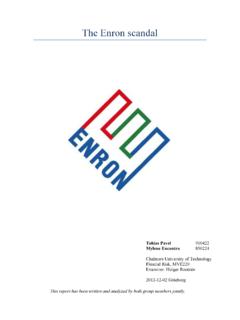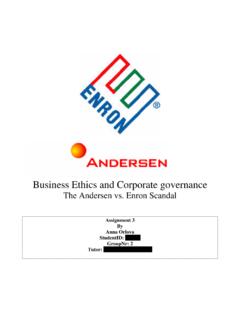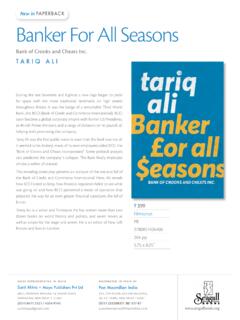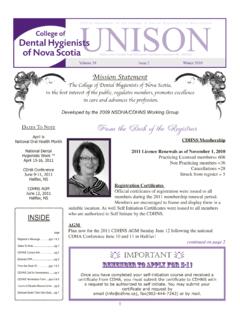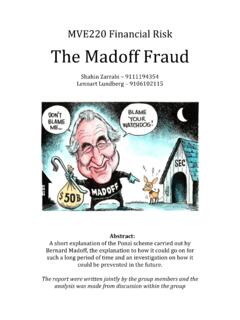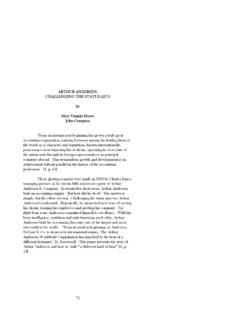Transcription of SOUTHEASTERN BANKRUPTCY LAW INSTITUTE: THIRTY …
1 SOUTHEASTERN BANKRUPTCY LAW institute : THIRTY -FIRST ANNUAL SEMINAR ON BANKRUPTCY LAW DUTIES OF DIRECTORS OF A FAILING COMPANY Presented by Mr. Paul Steven Singerman Berger Singerman 200 South Biscayne Boulevard Suite 1000 Miami, Florida 33131 Telephone: 305-714-4343 Fax: 305-714-4340 Grand Hyatt Atlanta Hotel Atlanta, Georgia April 14-16, 2005 THIRTY -First Annual SOUTHEASTERN BANKRUPTCY Law institute Seminar Atlanta, Georgia April 14-16, 2005 Duties of Directors of a Failing Company Paul Steven Singerman Douglas A. Bates I. Introduction Amid an ever increasing focus in the United States to hold directors and officers1 accountable for their actions, and despite economic forecasts indicating an upswing in the United States economy, the challenges confronting directors of financially distressed entities are growing.
2 In recent years, as several public companies have met their widely publicized and scandal-ridden demise, lawsuits against directors continue to stack up, and directors find themselves in the cross-hairs of litigation sights aimed at them from yet more constituents. Execution of duties and responsibilities by directors of financially distressed entities has never been a more treacherous undertaking. Quite simply, notorious and large business failures occasioned at least in part by director misconduct, like Enron and WorldCom, have resulted in significantly greater scrutiny for directors generally, and especially those who serve financially distressed businesses. Perhaps the best advice to directors can be found in the recent words of E. Norman Veasey, Chief Justice of the Supreme Court of Delaware, who mused that [d]irectors who are supposed to be independent should have the guts to be a pain in the neck and act independently.
3 2 This article focuses on the broad fiduciary duties of directors of companies that are solvent, insolvent and those residing, at least for a brief time, in the zone of insolvency. In addition, this article explores the various protections afforded to directors by the business judgment rule, and provides insight into actions that can be taken by directors in order to minimize personal exposure to liability they may incur resulting from their management decisions. II. The Business Judgment Rule and Incumbent Fiduciary Duties of Directors of a Solvent Corporations A. Director s Role as a Fiduciary Before exploring the complex fiduciary duties of directors of insolvent corporations, we first examine the fiduciary duties incumbent upon directors who manage the business and affairs of solvent corporations.
4 The wide array of decisions made and actions taken by a director managing a corporation are governed generally by the law of the state of organization of the 1 Throughout this article, the term directors generally will refer to both directors and officers. 2 Michael J. Riela, PROTECTING DIRECTORS AND OFFICERS OF CORPORATIONS THAT ARE INSOLVENT OR IN THE ZONE OF INSOLVENCY: IMPORTANT CONSIDERATIONS, PRACTICAL SOLUTIONS, 2 DePaul Bus. & Com. 295, 296 (Winter 2004) (quoting Julie Connelly, The Ghost of Michael Ovitz Still Haunts the Disney Board, Corp. Board Member ( 2003)). - 2 - corporation. Of course, if the corporation is a public reporting company, then Federal securities laws and rules also impose duties on directors.
5 Because many large corporations are incorporated in the State of Delaware, most in the regard the Delaware General Corporation Law as the most influential body of corporate statutory law. Decisional law from Delaware and other states has established that the directors of a solvent corporation stand in a fiduciary relationship with the corporation and its shareholders. This fiduciary relationship is not one to be taken lightly, as it encompasses a special relation of trust. Directors are charged with protecting the interests of the corporation and its shareholders as carefully as one would care for her own interest by holding fast to the two primary fiduciary duties of care and loyalty. In 1928, Chief Judge Benjamin Cardozo explained a director s special obligations as a fiduciary in Meinhard v.
6 Salmon as follows: Many forms of conduct permissible in a workaday world for those acting at arm's length, are forbidden to those bound by fiduciary ties. A trustee is held to something stricter than the morals of the market place. Not honesty alone, but the punctilio of an honor the most sensitive, is then the standard of behavior. As to this there has developed a tradition that is unbending and inveterate. Uncompromising rigidity has been the attitude of courts of equity when petitioned to undermine the rule of undivided loyalty by the "disintegrating erosion" of particular exceptions. Only thus has the level of conduct for fiduciaries been kept at a level higher than that trodden by the A director owes the corporation and its shareholders complete loyalty and honesty, and must serve the corporation with such honesty and loyalty each and every time the actions of the director concern matters affecting the general well-being of the corporation.
7 As fiduciaries who are charged with placing the well-being of the corporation first, directors stand at center stage with respect to corporate governance. As the Supreme Court of Delaware emphasized in the oft-cited case of Smith v. Van Gorkom,4 while acting in the managerial role, a corporate director is charged with unyielding fiduciary duties of care and loyalty, among others, to the corporation and its These crucial fiduciary duties form the foundation of the law of corporate B. Director s Duty of Care The court in Meyers v. Moody7 explained that the duty of care is that degree of care which a person of ordinary prudence would exercise under the same or similar circumstances. 8 3 See Harvey Miller, CORPORATE GOVERNANCE IN CHAPTER 11: THE FIDUCIARY RELATIONSHIP BETWEEN DIRECTORS AND STOCKHOLDERS OF SOLVENT AND INSOLVENT CORPORATIONS, 23 Seton Hall L.
8 Rev. 1467, 1473 (1993) (quoting Meinhard v. Salmon, 164 545, 546 ( 1928)). 4 488 858 (Del. 1985). 5 Id. at 872. 6 See Revlon, Inc. v. MacAndrews & Forbes Holdings, 506 173, 179 (Del. 1986); Guth v. Loft, 5 503 (Del. 1939). 7 693 1196 (5th Cir. 1982). 8 Id. at 1209 (5th Cir. 1982); see also Graham v. Allis-Chalmers Mfg. Co., 188 125, 130 (Del. 1963) ( Directors of a corporation in managing the corporate affairs are bound to use that amount of care which ordinarily careful and prudent men would use in similar circumstances. ). - 3 - It has been held that the duty of care is breached by a director who is grossly In addition, courts have found that the duty of care was breached in situations where director action could have prevented harm to the corporation, yet directors failed to act with due consideration of the consequences of However, a minority of courts have applied a more strict standard, requiring directors to exercise the same amount of care that an ordinarily prudent person would exercise in her personal In any event, in order to fulfill their fiduciary duties, directors must strive to act in an informed manner in all situations.
9 As will be discussed more fully infra, courts have applied the business judgment rule in evaluating a director s satisfaction of her fiduciary duty of care. As pointed out in Levine v. Smith,12 the business judgment rule creates a presumption that directors who made a business decision acted on an informed basis, in good faith, and in the honest belief that the action taken was in the best interests of the In order to enjoy the protections afforded to directors by the business judgment rule, directors are required to apprise themselves of all reasonably available information that would be material with respect to the particular business decision being made. As the Second Circuit made clear in Hanson Trust PLC v. ML SCM Acquisition, Inc.,14 Directors may be liable to shareholders for failing to reasonably obtain material information or to make a reasonable inquiry into material matters.
10 15 Once fully informed, directors must act within the scope of their duty of care, or face liability. C. Director s Duty of Loyalty Along with the duty of care, a corporate director owes both the corporation and its shareholders a duty of loyalty. Essentially, the duty of loyalty forbids a director from using her corporate position to obtain a personal advantage,16 and requires that directors act in good faith, with the best interests of the corporation at the forefront. The Supreme Court of Delaware in Guth v. Loft, the duty of loyalty as follows: Corporate officers and directors are not permitted to use their position of trust and confidence to further their private interests.. A public policy, existing through the years, and derived from a profound knowledge of human characteristics and 9 See Cede & Co.





